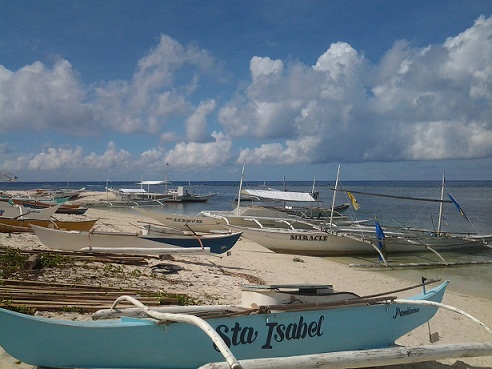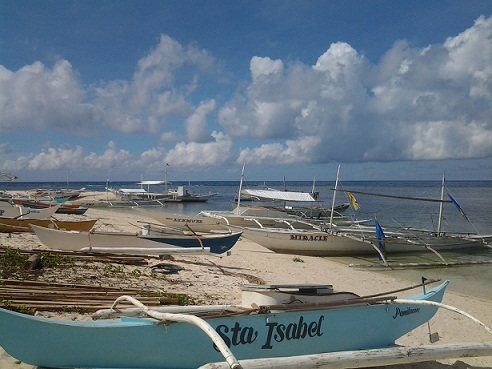By JOHNNA VILLAVIRAY GIOLAGON
PAMILACAN Island looks like a mound of green dumped in the middle of the Bohol sea.
Fine white sand line one side of the island while jagged cliffs the other. The serenity is broken only by waves lapping the shore and the bleating of goats.
Beneath the air of bliss that impresses the visitor, however, the island is under stress as the residents confront the hard reality that the days of whale shark hunting is over while still in search of a viable livelihood alternative.
An online search gives the impression of an Eden capitalizing on the boom of eco-tourism that made Bohol one of the top tourist attractions in the country. But the reality is that tourism supports only a small fraction of the local economy and poverty is very much part of Pamilacan’s landscape like its fine white sand and crystal blue waters.
The residents’ main source of livelihood used to be whale sharks hunting. “(We) are traditional fishermen of mantas and whales,” says barangay captain Tanie Gaas, whose grandfather and father both hunted whales.
Sixty-two year old Max Valeroso has been hunting sea giants since he was 15 years old. His very first job for his grandfather was diving two meters underwater to be able to stab the manta ray at the top of the head with a harpoon. This was how the rest of the team could haul the manta up to the surface without much of a fight.
But they do not hunt dolphins, contrary to public knowledge, Valeroso stresses.
Selling whale and manta meat enabled Valeroso to send his two daughters to school and build a modest bungalow by the sea.
In the 1960s, a manta ray fetched P300 apiece. But in 1998, whale shark hunting, which included manta rays, was declared. Being a forbidden commodity, manta rays now sells at P50, 000 per head.
Valeroso says the manta rays get caught in the net when they do ordinary fishing. “By the time we bring the net up, they’re already dead so it’s useless to throw them back in the water,” he explains adding that it is no one’s intention to break the law.
 Pamilacan, about an hour’s boat ride from the mainland, is a close-knit fishing community largely dependent on the bounties of the sea. The island’s name even comes from the word pamilac, referring to the harpoon used to hunt whales.
Pamilacan, about an hour’s boat ride from the mainland, is a close-knit fishing community largely dependent on the bounties of the sea. The island’s name even comes from the word pamilac, referring to the harpoon used to hunt whales.
Being a small island of rock and coral, Pamilacan is inhospitable to farming. It also has no fresh water supply; drinking water is imported from mainland Bohol in jugs while bath water is salty.
Pamilacan enjoys electricity service only a few hours every night—only long enough to charge cell phones and some laptops that allow contact with the outside world.
The ban has taken toll on the livelihood of the residents. “Now, I’m afraid my eight grandchildren won’t even get to finish school, Valeroso says.
There are times, he relates, when he, already considered affluent in the community, was so short on cash he couldn’t buy staples like rice, coffee and sugar, or medicine.
The promise of an alternative livelihood in eco-tourism is enjoyed roughly by 10 in 30 families.
But even those engaged in tourism are barely scraping by.
Pamilacan is eclipsed in popularity by nearby Panglao.
Kapitan Tanie sees that dolphin watching tour can be an alternative livelihood for Pamilacan but Valeroso is not fully convinced.
“The dolphin watching tours helped the island a little, but not everyone. Only a small percentage of residents benefit from tourism,” he argues. “If you do not have a boat, can you join the dolphin tours? And not everyone in the island owns a boat.”
Tour operator Jojo Baritua, a former consultant for the World Wide Fund for Nature (WWF), acknowledges that the island has not benefited from eco-tourism as much as it should.
Part of Pamilacan’s inability to attract tourists is due to the lack of promotion. And, because there aren’t enough tourists, there are also no regular boat trips to take spur-of-the-moment guests to the island.
It’s a chicken-and-egg problem that, Jojo believes, will solve itself once tourists begin coming in.
“If more tourists came to Pamilacan, the locals would see the value of tourism and marine conservation,” Jojo says.
